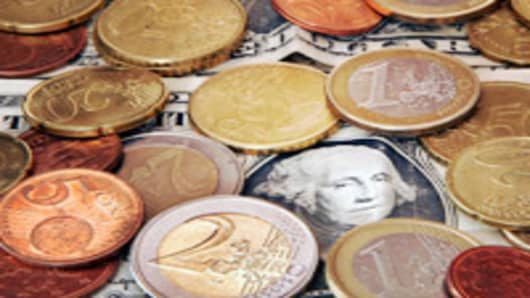Worried euro zone policymakers pressured on Washington on Tuesday to do more to halt the dollar's decline, a day after the U.S. currency hit a record low against Europe's single currency.
Guy Quaden, Belgium's representative at the European Central Bank, said in an interview on Belgian radio: "Things are becoming exaggerated."
"It's up to the relevant authorities to assume their responsibilities and particularly for U.S. authorities, who repeat that they are in favour of a strong dollar but who should reaffirm their words," he said.
The Europeans are worried that the slide is getting out of hand after the dollar sank below $1.50 per euro last week.
Belgian Finance Minister Didier Reynders, attending a second day of meetings with European colleagues on Tuesday, put it less bluntly than Quaden but the basic message was the same, which Europe was counting on active U.S. help to tackle an issue which makes life harder for euro zone exporters in world markets.
"We are also happy to see the reaction in the U.S. They are also concerned about that. So it may be a first step to a good collaboration between Europe and the U.S. in this field," he told reporters.
French Prime Minister Francois Fillon added his voice to the rising chorus of complaint, echoing similar declarations overnight at a Brussels meeting of the euro zone's finance ministers and ECB President Jean-Claude Trichet.
"There is a problem in the relationship between the dollar and the euro," he told French Europe 1 radio, saying exchange rate developments were partly to blame for the rising price of commodities, which from oil to wheat are soaring.
Verbal Intervention Only?
The euro, which bought just a little more than 80 U.S. cents at its weakest back in 2000, hit a record $1.5275 on Monday according to Reuters data.
In 2000 the ECB intervened in currency markets to stem the euro's slide, but there has been no public hint that it might do the same now to push the exchange rate in opposite direction.
Asked whether the Eurogroup of European finance ministers had discussed the possibility that central banks might directly sell or buy currencies, Greek Finance Minister George Alogoskoufis told reporters in Brussels on Tuesday: "No, no, there was no discussion of that."
The Eurogroup, which met late on Monday in Brussels, talked at length about currency developments and agreed with Trichet to voice their mounting concern, mainly via Luxembourg prime minister Jean-Claude Juncker, chairman of the Eurogroup, a forum where ministers confer with Trichet.
"In the present circumstances we're concerned about exchange rate moves," Juncker said on Monday, adding that what he had to say was agreed by all in the Eurogroup meeting.
"We have never previously said that we were concerned on the basis of current circumstances. We don't think the recent moves are reflecting economic fundamentals," he said.
Trichet held no news conference but did his bit to suggest that there were limits to acceptable dollar weakness.
Breaking with a tradition of not commenting to the media outside formal news conferences, Trichet stopped on his way into the Eurogroup meeting on Monday to make a statement to journalists.
He stressed that Washington favored a strong dollar. But what was more unusual was that he opted to make the point on the sidelines of a meeting that he routinely enters and exits with no more than a polite hello to the media.
"In the present circumstances, I consider it very important what has been affirmed and reaffirmed by the U.S. authorities including the Secretary of the Treasury and the President of the United States, according to whom the strong-dollar policy is in the interests of the United States of America," Trichet said.
Washington did not remain silent either. "A strong dollar is in our nation's interest," U.S. Treasury Secretary Henry Paulson said on Monday.
"The long-term (U.S. economic) fundamentals are very solid and they're going to be reflected in our currency," he told Bloomberg TV.
Euro zone officials have been complaining for more than a year about the weakness of other currencies from the dollar to the Japanese yen and China's state-controlled yuan.
One factor buoying the euro versus the dollar is Europe's relatively better economic situation compared to the U.S., which many believe is on the brink of recession if not already there.
Another is the refusal of the European Central Bank to reduce interest rates. The U.S. Federal Reserve, by contrast, has cut interest rates 2.25 percent since last September.
Markets expect the ECB to leave rates unchanged at its policy meeting on Thursday.


